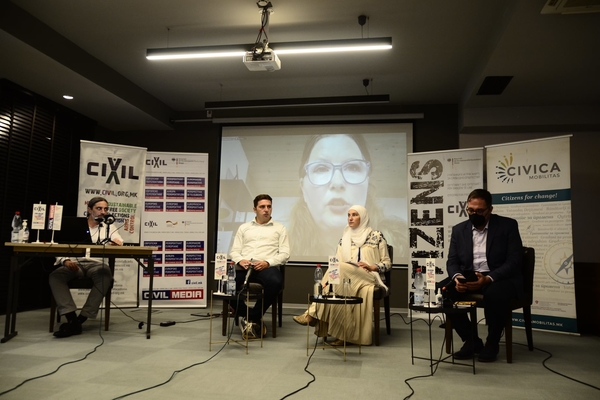Mrs. Marion Kraske is a prominent political analyst and media expert, with more than 20 years of experience in the media scene. She was a journalist with the German Press Agency, (DPA), the First German Television ARD (“Tagesschau”), “Der Spiegel” at the Foreign Desk and as director of the Spiegel-office in Vienna covering the Western Balkans. Her research focuses on NS-history, reconciliation, right-wing extremism and state- and nation building processes.
On the Regional conference organized by CIVIL and Balkan Forum on attacks against democracy held in Skopje on 28th of June 2021, speaking on how disinformation disrupt the public discourse and encourage radically insulting rhetoric and hate speech, Ms Kraske stressed that fake news are becoming a global challenge, that’s why we need global agendas, networks, we have to question people in power.
“I would like to focus on the global level, but also on the journalistic perspective. We have three main pillars of democracy, legislators, executive power and judiciary, and in an ideal world of the functioning democracy, we have also the fourth pillar, which is the media. With the tasks of information, delivering fact based information, communication control, and also, important for the media pillar, to act as a corrector of the important people, also to the three other pillars I mentioned before. It’s very crucial to understand”, said Ms. Kraske at the Conference in Skopje.
Going back to the beginnings of her journalist career some decades ago, she reminded that in Germany at that time there was ‘the Spiegel day’, on Mondays, when the public was waiting for Monday for it to be published, and to read most important facts during the week. “That was delivered by Der Spiegel. With the upcoming of the Internet, this changed a lot. Actually, we saw that the digitalization provided a lot of chances for media sector, but we also have to state that we are facing disadvantages since then the news sector and the media sector has changed fundamentally”, pointed out Ms. Kraske.
According to her, nowadays, everybody can infuse their content- so called news on the internet. “We have a bipolarity – a fact based professional journalism, but on the other hand, we have a flow of disinformation and fake news. And this trend is becoming more and more global. People no longer believe what the professional media is providing, it’s undermining the democracies, and it led to several attacks on journalists worldwide, while they were just doing their jobs, by delivering facts. People get their information from questionable and not very transparent sources, such as Facebook and Instagram”, said Ms.Kraske in her speech.


She then focused on three examples, which show how misinformation brings democracies in danger.
“First, is the topic of migrants. We saw this in Germany in 2015-16 when there was a high influx of migration. Right wing propaganda machinery started discrediting the migrants and the government. Even though, after 2017 we had a normalization of the situation, till right wing propaganda was infused in the internet, and the narrative was that there is a lot of migrants that puts Germany, Christianity in risk. The fact that Germany needed workers, 260 00 per year, was not mentioned. However, as a consequence, we see that the public discourse is highly radicalized. Right wing propaganda brings traditional democracies under pressure”, explained Ms.Kraske.
As the second example, she mentioned the US elections in 2020. “The Trump administration launched a tsunami of fake news during the 4 years of Mr. Trump’s time in the White House, but this culminated in the narrative of a stolen election after the elections took place last year, so the narrative was influential. In contrary, there was a study that this was one of the most secure elections in the history of America. The Republican Party was supporting these fake news, and fake narratives, and as a consequence we saw a storm happen on the 6th of January when right wing extremists, but also ordinary people stormed the Capitol Hill and attacked the police. This was a clear attack on state institutions based on wrong narratives. And again, it shows how a functioning democracy is put under danger only by using a wrong narrative”, stressed Ms.Kraske at the conference in Skopje.
In Kraske’s opinion, cyber-crime is only one aspect, but societies and actors should also focus and reflect on the propaganda machineries coming from the people in power, especially in southeastern Europe.
“As the third example of these mechanisms, I would say was the corona pandemic, as another example of spreading of disinformation. We had a trend of undermining the state institutions and health experts. We saw this in Germany, America, Brazil, as a worldwide trend, but especially in the Western Balkan countries. At the end, we saw two major consequences, the denial of the pandemic and the denial of the dangers of the virus itself. We were confronted with conspiracy theory of any kind. These attacks pretty much organized. Some of these fake news were also coming from Russia. So, as a consequence we can clearly state that his was a hybrid war, a war about facts, and the resistance of broader social groups did not accept the “lock down” rule, the regulations, they didn’t have interest for the vaccination… So, in this contekst we saw a radicalization of the public discourses and destabilization effects. For example, in Serbia we saw attacks against the government, but also against the jounrliasts and experts”, said Kraske.
In a conclusion, Ms.Kraske emphasized that fake news are becoming more and more a global challenge. That’s why we need global agendas, global networks, we have to question people in power.
“We have to clearly say that this is also a problem in the EU. We need to focus also on media literacy, education. We should create a network in South-East Europe. We will proceed with this. We should create a network of free media. Hopefully, you will join us in establishing this network. This would help in making the problem visible and then to work on counter measures”, pointed out the German analyst in the conclusion of her speech at the conference in Skopje.
Camera: Atanas Petrovski
Video editing: Arian Mehmeti
Photography: Ognen Boshnjakovski

















